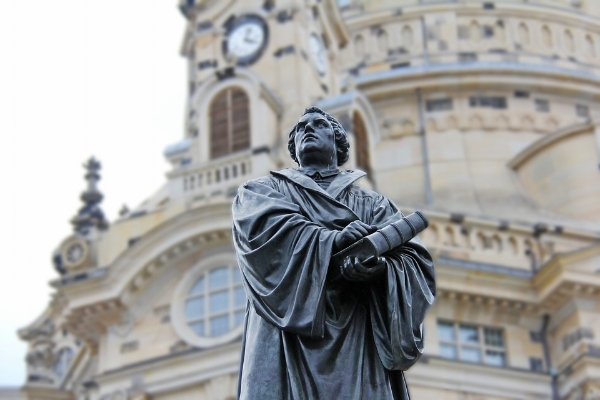“I will ask God mercifully to protect us. Then I will fumigate, help purify the air, administer medicine, and take it. I will avoid places and persons where my presence is not needed in order not to become contaminated and thus perchance infest and pollute others, and so cause their death as a result of my negligence. If God should wish to take me, he will surely find me and I have done what he has expected of me and so I am not responsible for either my own death or the death of others. If my neighbor needs me, however, I will not avoid place or person but will go freely…” See, this is such a God-fearing faith because it is neither brash nor foolhardy…
I read these words of advice this week. They were timely in light of the rise of COVID-19 to pandemic proportions. (Bonus if you know where these words are from without reading ahead.) They didn’t come from Twitter or Facebook. They aren’t from a blog or magazine. I didn’t hear them in a sermon or podcast. They came from a much older, much lower-tech age. They are the words of the great Protestant reformer, Martin Luther, in an open letter with his thoughts about the proper response of Christians during an outbreak of the bubonic plague.
Admittedly, the stakes we are facing with the coronavirus are not as high as those of the black death, but I find that the major themes of Martin Luther’s advice still stand today.
1. Do not be consumed by fear. Luther prays—for God’s protection and intervention—and refuses to be controlled by fear. I’ve said often that as Christians our actions in such situations should be governed by faith plus facts, not by fear. We can face the world with realism (facts) but not be dominated by fear because we have faith in a good and powerful God. This does not mean we don’t take appropriate precautions (see more below), but it does mean we do not need to succumb to panic. This rejection of fear may be easier for some of us than others, but even for those of us who suffer from anxiety, it is the goal. We hold the steadfastness of God’s faithfulness and grace in front of our eyes, and we cling to the resurrection hope he offers us, even if we must remind ourselves of these things moment by moment.
2. Love your neighbor. Luther hinges his entire argument on the command to “love your neighbor as yourself.” In his day, that meant a willingness to risk contracting the plague yourself if your neighbor was in need of spiritual comfort or of physical care. Today, it may still mean those things or may take other forms. It may mean running errands or going to the store for a “neighbor” who is of higher risk. It may mean supporting families with children or college students who have had their schools shut down. It may mean speaking up against a hateful or racist comment or act toward an Asian or Asian-American (yes, it’s happening). It may mean checking in on someone who lives alone during a quarantine. It may be a note or a phone call to someone who is ill or anxious.
Think about your situation, your neighborhood, your church community, and use your imagination. As we walk through the next days, weeks, and months, let this be what shapes your thoughts and your actions: how can I love my neighbor today?
Luther mentions one other way to love your neighbor that remains particularly pertinent today:
3. Love your neighbor by taking care of yourself. I have heard people shrug off concern over the coronavirus outbreak because it’s only dangerous for the elderly or immunocompromised. I have heard them downplay its significance because it won’t do much harm to someone young and relatively healthy—like them, like me. This is not driven by a love of neighbor. We are given an opportunity to suffer inconvenience for the sake of caring for those who may be vulnerable. We are given a simple way to protect and affirm the dignity of their lives and health.
So, we follow the advice given to us by the medical community at the moment. For starters, we wash our hands (seriously, please do this). We don’t go out if there’s a possibility we’re sick. As they come, we honor the recommendations and restrictions put in place for “social distancing” to slow the spread of the virus enough for the medical community to not become overloaded, putting even more people unnecessarily at risk. (If you haven’t seen the “flattening the curve” chart yet, you can look at it here. It gives a good visual for why this is necessary.) We do these things not out of fear or hysteria. We do them because it is a simple way to love our neighbors who could suffer “as a result of [our] negligence,” in Luther’s words.
Each day, we face a new onslaught of news reports, statistics, diagrams, and hot takes about the COVID-19 pandemic. It’s easy to get swept up in it all. But this is my adopted approach, and I would encourage you to put it into practice as well. Faith and facts, not fear. This means I spend time praying. It means I make sure I am getting good information (facts) to guide my understanding and actions related to this virus (unless you are an infectious disease specialist, it’s a time worth listening to the professionals). But above all it means I seek to love my neighbor as myself, just as Jesus commanded.



